
AR-B1652 User’s Guide
18
4. BIOS CONSOLE
This chapter describes the AR-B1652 BIOS menu displays and explains how to perform common tasks needed to
get up and running, and presents detailed explanations of the elements found in each of the BIOS menus. The
following topics are covered:
BIOS Setup Overview
Advanced CMOS Setup
Peripheral Setup
Boot
BIOS Exit
4.1 BIOS SETUP OVERVIEW
The BIOS is a program used to initialize and set up the I/O system of the computer, which includes the
ISA bus and connected devices such as the video display, diskette drive, and the keyboard.
The BIOS provides a menu-based interface to the console subsystem. The console subsystem
contains special software, called firmware that interacts directly with the hardware components and
facilitates interaction between the system hardware and the operating system.
The BIOS default values ensure that the system will function at its normal capability. In the worst
situation the user may have corrupted the original settings set by the manufacturer.
After the computer is turned on, the BIOS will perform diagnostics on the system and display the size of
the memory that is being tested. Press the [Del] key to enter the BIOS Setup program, and then the
main menu will show on the screen.
The BIOS Setup main menu includes some options. Use the [Up/Down] arrow key to highlight the
option that you wish to modify, and then press the [Enter] key to select the option and configure the
functions.
Setup Main Menu
The <Main> option allows you to record some basic system hardware configuration and set the system clock
and error handling. If the CPU board is already installed in a working system, you will not need to select this
option anymore.










































